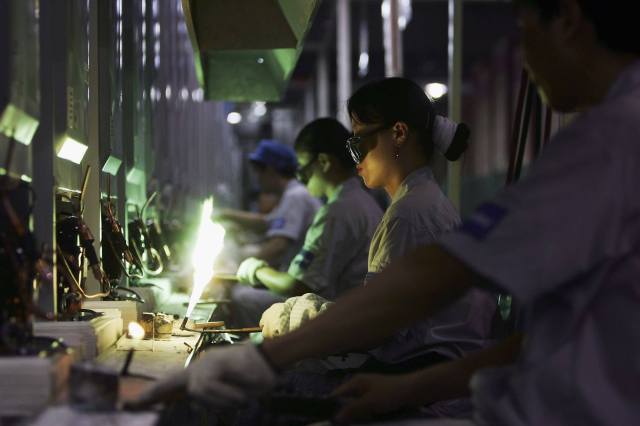Can China move beyond being “a mere assembler”? Credit: Cancan Chu / Getty

“China is a sleeping giant. Let her sleep, because when she wakes she will move the world.”
The quotation is attributed to Napoleon Bonaparte, who knew a thing or two about moving the world. His words have been endlessly re-quoted – in countless articles about the irresistible rise of today’s China as an economic, technological and military superpower.
It’s not all hype, of course. Many of the ‘killer facts’ really are true. For instance, China really did use more concrete in three years (2011-13) than America did in the entire 20th century.
But however impressive the scale of Chinese investment and technology, it’s important to realise that the People’s Republic is not omnipotent.
Consider the Belt and Road Initiative, a vast programme of actual and proposed infrastructure investment designed to link-up markets across the Eurasian landmass and beyond. In theory, the sum total of investment could reach $8 trillion; in practice the initiative is already running into trouble.
Writing for Bloomberg, Mihir Sharma, focuses on the political backlash against China’s BRI investment in Malaysia:
“In many ways, China’s stumbles in Malaysia are exactly what BRI skeptics had always warned would happen in countries across Asia. Projects that might be easy to execute in China would run into delays and cost overruns in less-regimented countries; growth in debt, deficits and Chinese immigration would spark political opposition; and, when a new political leadership cancelled those projects, bilateral and multilateral tensions would spike.”
Malaysia is not alone. Other Asian and European countries are also having second thoughts:
“China has a capital surplus that needs to go somewhere. But, if it wants its investments to be sustainable, China will have to behave in these countries a lot more like the Western capital it seeks to displace. That means being cautious, cooperative with local capital and civil society, and respectful of political sentiment, even from dissidents.”
Needless-to-say, democratic give-and-take isn’t exactly exactly a ‘core competence’ of the Chinese government. The input of western partners in the Initiative is looking more important than ever.
Another area in which Chinese economic policy has had a shock-and-awe effect is state investment in leading-edge technology. Examples include quantum computing, artificial intelligence and driverless vehicles.
The gaps in China’s technological prowess get rather less attention. Here’s an earlier Bloomberg article, in which Adam Minter highlights an especially surprising example:
“Semiconductors are the building blocks of electronics, found in everything from flip phones to the servers that make up a supercomputer. Although China long ago mastered the art of making products with semiconductors produced elsewhere (the iPhone is the most famous example), it wants to move beyond being a mere assembler…
“…China is currently the world’s biggest chip market, but it manufactures only 16 percent of the semiconductors it uses domestically.”
With western trade policies taking a Trumpian turn, acquiring chip technology from other countries is going to be harder than ever. However, developing the technology at home also presents a challenge:
“For decades, labor-intensive industries – such as assembling mobile phones – were the route to riches in China, attracting investment from entrepreneurs and bureaucrats alike. Making semiconductors, by contrast, requires billions in up-front capital and can take a decade or more to see a return.”
Minter gives the example of Intel which invests billions of dollars in R&D every year. As important as public investment is at the very frontiers of technology, one has to question whether the state can substitute for product-orientated innovation by companies who know their business better than any government could. For all its flaws, the western model of capitalism still has some key advantages.
Of course, in questioning the idea of an unstoppable China it is important not to go to the opposite extreme. Despite its many problems, including horrendous pollution, growing personal debt and its deep social inequalities, China is a giant, it is awake and it will continue to move the world.
Then again, that makes the country’s weaknesses all the more important.










Join the discussion
Join like minded readers that support our journalism by becoming a paid subscriber
To join the discussion in the comments, become a paid subscriber.
Join like minded readers that support our journalism, read unlimited articles and enjoy other subscriber-only benefits.
Subscribe